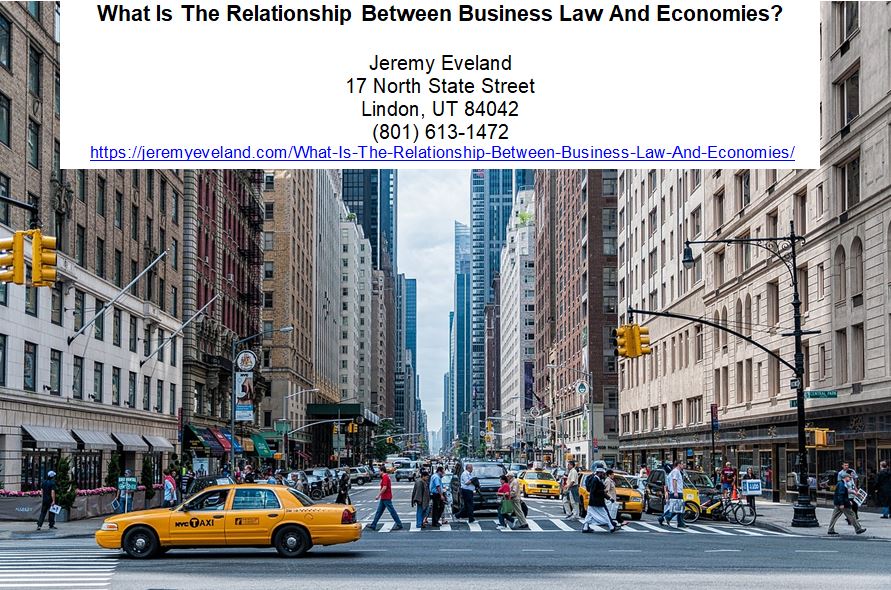What is the relationship between business law and economies?
Business law is a central component of a successful economy. It is essential for the protection of economic interests, and provides a framework for businesses to operate within. Business law also serves to protect the rights of all parties involved in economic transactions. While there is no single definition of business law, it is generally understood to encompass the body of laws that govern business operations and transactions. Business law relates to the various aspects of a business, including contracts, labor laws, taxation, and other related matters. In the United States, the laws that govern business are generally made up of both state and federal laws, as well as common law. This article will discuss the relationship between business law and economies, and will provide an overview of how business law is related to economic growth and stability.
Business Law and Economic Growth
The role of business law in economic growth is often overlooked. However, it is an essential component of any economy. Business law provides stability and predictability, which are essential for the growth and prosperity of any economy. A well-structured legal system provides businesses with the assurance that their rights and interests are protected, and that any agreements or contracts they make will be upheld. This encourages businesses to invest, hire, and expand, which leads to increased economic growth.
Business law also promotes transparency and accountability, which are essential for reducing corruption and improving economic efficiency. Laws that regulate business activities ensure that businesses are operating in a fair and transparent manner. This can help to reduce corruption and protect the interests of consumers. In addition, laws that regulate business activities can help to reduce the cost of doing business, which can lead to increased economic growth.
Business Law and Economic Stability
In addition to promoting economic growth, business law also plays an important role in maintaining economic stability. Laws that regulate business activities can help to reduce the risk of financial crises, such as the 2008 financial crisis. Such laws help to regulate the financial markets and ensure that businesses are operating in a safe and responsible manner. In addition, laws that promote transparency and accountability can help to reduce the risk of financial fraud and other unethical practices. This can help to reduce the risk of financial crises, which is essential for maintaining economic stability.
Business Law and Utah
Business law is an important part of the Utah economy. The state of Utah has several laws that regulate business activities, including the Utah Business Corporation Act (UBCA) and the Utah Uniform Commercial Code (UCC). The UBCA regulates the formation and operation of corporations in the state, while the UCC regulates the sale and transfer of goods and services. In addition, Utah has several laws that regulate labor, such as the Utah Wage and Hour Act, which sets minimum wage and other labor standards.
The state of Utah also has several laws that promote economic growth, such as the Utah Technology Commercialization and Innovation Act. This act provides incentives for businesses to invest in research and development activities in the state. In addition, the state has several laws that promote economic stability, such as the Utah Securities Act, which regulates the sale of securities and other financial instruments.
Utah Technology Commercialization and Innovation Act
The Utah Technology Commercialization and Innovation Act (TCIA) is a comprehensive set of statutes that provide incentives to businesses and entrepreneurs to bring innovative technologies to market. The TCIA provides specific guidelines for the development of intellectual property and commercialization of those technologies through grant funding, tax credits, and other incentives. In addition, the TCIA grants the Utah Technology Council a critical role in overseeing the implementation of the Act.
In a recent Utah Supreme Court decision, the court held that the TCIA’s grant funding provisions are valid and enforceable. Specifically, the court determined that the TCIA’s grant funding provisions are consistent with the Utah Constitution’s requirement that the state is proactively engaged in the development of technology. The court also held that the grant funding provisions do not impinge on the right of the legislature to appropriate funds for state purposes.
In addition, the court held that the TCIA’s tax credit provisions are also valid and enforceable. The court determined that the tax credit provisions are consistent with the Utah Constitution’s requirement that the state provide incentives to businesses and entrepreneurs to bring innovative technologies to market. The court further held that the tax credit provisions do not violate the due process rights of any person or business that may be affected by the tax credits.
Finally, the court held that the Utah Technology Council has the authority to oversee the implementation of the TCIA. The court determined that the Utah Technology Council has the authority to review and approve grant applications, review and approve tax credit applications, and conduct any other activity necessary to ensure that the TCIA is properly implemented. The court also noted that the Utah Technology Council is subject to the oversight of the legislature, and must act in accordance with applicable statutes and the TCIA.
The Utah Supreme Court’s recent decision confirms the validity of the TCIA’s grant funding and tax credit provisions, and affirms the authority of the Utah Technology Council to oversee the implementation of the TCIA. This decision provides an essential framework for businesses and entrepreneurs to take advantage of the financial incentives available through the TCIA, and encourages the development of innovative technologies and commercialization of those technologies in the state of Utah.
Utah Securities Act
In Utah, the Securities Act of 1956 provides for the regulation of securities transactions and the prevention of fraud in the state. It is a comprehensive law that requires filing of certain documents and registration of securities before they can be offered for sale in Utah. The Act also provides for the registration of broker-dealers and investment advisors and regulates their activities, as well as the activities of other professionals in the securities industry. Additionally, the Act creates civil and criminal penalties for violations of its provisions.
The Utah Supreme Court has upheld the constitutionality of the Act in several cases. In the case of Utah Securities Corp. v. Utah State Securities Commission, the court held that the Act was a valid exercise of the state’s police power to protect the public from fraud and other abuses in the securities industry. The court noted that the Act’s provisions were necessary to protect the public from deceptive practices in the securities industry and that the Act was a reasonable exercise of the state’s authority.
In another case, Utah State Securities Commission v. Jones, the court held that the Act was not an unconstitutional infringement on the First Amendment’s guarantee of freedom of speech. The court noted that the Act was a reasonable exercise of the state’s police power to protect the public from fraud and that the Act did not prohibit the sale of securities, but merely regulated the manner in which they were offered and sold. The court also noted that the Act provided for disclosure requirements that allowed buyers to make informed decisions about the securities they were purchasing.
The Utah Supreme Court has also held that the Act was not an unconstitutional taking of property in violation of the Fourteenth Amendment in the case of Utah State Securities Commission v. Johnson. The court found that the Act provided adequate compensation for the taking of a person’s property by requiring the registration of securities and the filing of certain documents, and that the Act was a reasonable exercise of the state’s authority.
The Utah Supreme Court has consistently held that the Utah Securities Act is a valid exercise of the state’s police power to protect the public from fraud and other abuses in the securities industry. The Act’s registration and disclosure requirements are necessary to ensure that buyers make informed decisions about the securities they are purchasing, and the court has found that the Act provides adequate compensation for any taking of property that may occur. The Utah Securities Act is an important tool for protecting the public from fraud and deception in the securities industry.
Business Law
Business law is an essential component of any economy. It plays a critical role in promoting economic growth and stability. Business law provides a framework for businesses to operate within, and helps to protect the rights of all parties involved in economic transactions. In the United States, business law is generally composed of both state and federal laws, as well as common law. In Utah, the laws that regulate business activities include the UBCA, the UCC, and various labor laws. These laws are essential for protecting economic interests and promoting economic growth and stability.
Business Law Consultation
When you need legal help with a business, call Jeremy D. Eveland, MBA, JD (801) 613-1472 for a consultation.
Jeremy Eveland
17 North State Street
Lindon UT 84042
(801) 613-1472
Related Posts
The Utah Uniform Partnership Act
The 10 Essential Elements of Business Succession Planning
Business Succession Lawyer Taylorsville Utah
Business Succession Lawyer South Jordan Utah
Business Succession Lawyer Lehi Utah
Business Succession Lawyer Millcreek Utah
Business Succession Lawyer Murray Utah
Business Lawyer Salt Lake City Utah
Salt Lake City Business Transaction Attorney
Business Succession Lawyer Herriman Utah
What Are The Advantages Of Hiring A Business Lawyer?
Business Succession Lawyer Logan Utah
What Is The Relationship Between Business Law And Economies?










